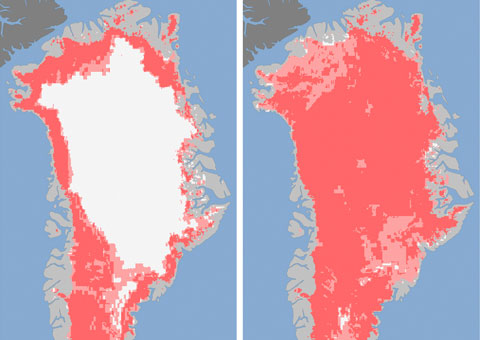bobgnote
Rookie
- Nov 24, 2008
- 1,258
- 38
- 0
- Banned
- #61
Greenland's ice sheet is melting fast

-----------------------------


I wasn't hugely surprised to see the news from Nasa about unprecedented melting of most of the Greenland ice sheet surface. Much of Greenland has been experiencing record warmth since May, and on the 29th of that month the weather station in the extreme south reached a positively balmy 24.8C, which set a new record May temperature for the country; this is significant because records from several weather stations extend back to the late 19th century.
The unusually warm conditions prevailed for much of June and into July, with the Danish Meteorological Institute website showing Greenland temperature anomalies about 2-4C higher than the 1961-90 baseline average during these last three months. Kangerlussuaq, the "gateway to Greenland" in the southwest, reached 24.6C on 10 July, just as the record melt reported by Nasa was under way.
This comes against a background of Greenland already having warmed 2.3C on average in summer over the past 20 years; this might not sound a great deal but is more than three times greater than the northern hemisphere average temperature increase of 0.5C in the same period.
For every 1C rise in temperature, the resulting effect is to increase the amount of melt by around a third, so we might expect double the climatological "normal" amount of meltwater being produced by the ice sheet during June and July this year.
The Nasa satellite picture of melt covering most of the ice sheet surface on 12 July (corroborated by several independent satellite methods and research groups) is dramatic, and several key Greenland scientists have confirmed it is unprecedented in the satellite record going back to the late 1970s. However, Nasa also cites evidence from ice cores at the summit of the ice sheet that suggest similar wholesale melting events occur once every 150 years on average, and the last one was in 1889. If this is this case, the recent melt may be due to natural climate variability, so do we have anything to worry about?
I consider we have good reason for concern. My own work, in collaboration with various international groups including the Danish Meteorological Institute and Free University of Brussels , involves analysing Greenland temperature records and running computer models of meltwater losses and mass balance of the ice sheet.
The last six summers since have seen successive record warmth and surface melt and runoff of that meltwater signalling increased mass loss from the ice sheet. This tallies with satellite observations from several independent methods showing a significant and accelerating mass loss of 250bn tonnes per year from the ice sheet averaged over the past five years or so. Although we cannot yet reliably predict how the ice sheet will respond to ongoing global warming the general prognosis is not good: more warmth clearly means more melting.
Moreover, recent changes in the northern hemisphere polar jet stream in summer – which may well be related to human-enhanced global warming – have led to more warm air being drawn up over the flank of the ice sheet, contributing to the enhanced regional warming and extra icemelt.
Even without sustained global warming, the Greenland ice sheet is living on borrowed time. If all the ice sheet melts, sea levels will rise by more than seven meters. Although it will take several thousand years for the ice to melt in its entirety according to current estimates, it is quite possible that the ice sheet could add up to several tens of centimetres to the global sea level by 2100

-----------------------------


